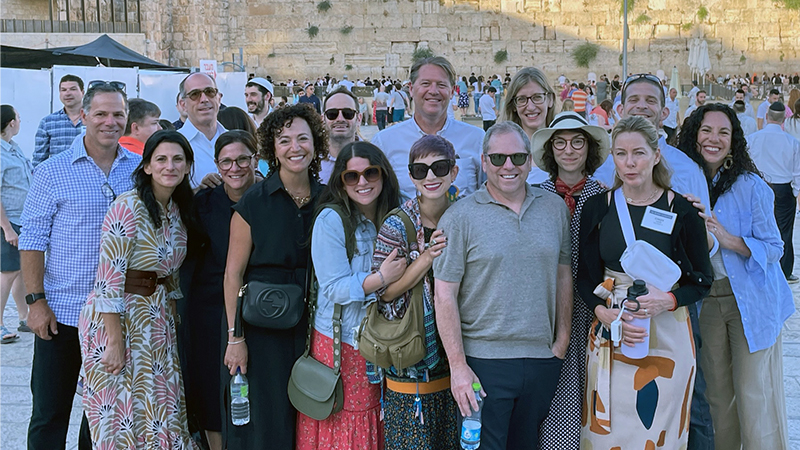Danielle V. Minson — Raising the Bar

Why we prioritize “shared society” projects in Israel
Why did we prioritize “shared society” projects in our allocations to Israel this year?
Because of girls like Rana. After attending a bilingual, Arab Jewish summer camp in Haifa this summer, the eight-year-old said, “I had so much fun at camp and loved meeting new Hebrew-speaking and Arabic-speaking friends.”
The Jewish Federation of Cincinnati every year commits to allocating approximately one-third of its Annual Campaign overseas. Much of this goes each year to two large organizations: the Jewish Agency for Israel (JAFI) and The American Jewish Joint Distribution (JDC), our Global Jewish 9-1-1. Our International and Overseas Committee (I&O), a subset of the Planning & Allocations Committee, also does a separate, smaller allocation, typically to Israel-based programs. This year its Vice President is Gary Greenberg, and the chair of its allocations committee is Michelle Kohn.
I’ve just returned from Israel myself, the culmination of a leadership education opportunity through the Wexner Heritage Program. In fact, it was myself, Brian Jaffee, Executive Director of the Jewish Foundation of Cincinnati, and 17 other volunteers in our community. We have built great relationships over the past three years in the program.
While I have lived in Israel, and also visited countless times, this time was different. We spent more time with Arabs and Palestinians than I ever have before. I visited two organizations where Arabs and Jews focused on a shared-society platform. It was enlightening (did you know there are 23 different ways Israel’s Muslims identify themselves?), and I worked hard to listen with an open heart and mind.
As a result, I am more committed than ever to what our I&O committee, and the national Jewish Federation system overall, has decided is our new funding priority for Israel: the goal of a shared society. We remain committed to our pluralism projects in Israel, which we have funded for years. These are well underway and have achieved considerable success. We will still fund these this coming year through our national organization Jewish Federations of North America’s iRep project.
At its heart, the idea of a shared society is a successor to what was the dominant idea of coexistence. Coexistence implies a kind of next-to-each-other, peaceful togetherness. But now, as Israel grows and changes and becomes an ever more complex nation, with ongoing waves of immigrants, and many faith traditions, the most powerful, I would even say loving, response to the question of how to have a successful culture is to embrace and value differences.
For example, Rana would never have met half her friends if she had gone to a typical Israeli summer camp. Her camp has been run for 31 years by the Haifa branch of the Leo Baeck Education Center.
The organizations we will fund this coming year embrace the goal of a shared society and, in the case of Ukraine, provide support for those overseas living through a war:
1. Leo Baeck
• Ongoing training for graduates to generate projects that promote shared society. Funding: $15,000
2. Atida-Promoting Haredi Women | HaDaSim
• Recruiting and training Haredi women as Data Science engineers in the IDF intelligence and cyber units. Funding: $20,000
3. Tikkun | Bustan – A Shared Community Building a Shared City
• Social change initiative in partnership between Arab and Jewish residents in Nof Hagalil. Funding: $15,000
4. Krembo Wings | Conflict Resolution Program
• Facilitation of cross-cultural conversations focused on disability inclusion and co-existence. Funding: $23,000
5. Ukraine Emergency Relief Allocation
• Funding: $15,200
A shared society is about being neighbors and friends instead of simply living side by side. It’s a commitment to integrating and having relationships. Ultimately, building a society of inclusion, equality, and justice for all of Israel’s citizens is a moral imperative. As Rana’s more cautious older friend, 11-year-old Gali, said: “I think because of this summer camp, I believe that Arabs and Jews can have better relations than they do now.”
It is a learning process. As a society how do we look at differences? How, on the ground, do we hold to our Jewish values of repairing the world and being a light unto the nations? I look forward to talking more and hearing more from you about how we are moving forward in Israel.
Warmly,
Danielle
PS: In other news:
• We welcome Rabbi Ari Ballaban, our new Jewish Community Relations Director, who just started at the end of July.
• We are continuing work on our community’s strategic plan, Cincinnati 2030.
• We are starting an audit through the Matan Group to measure our community’s inclusion efforts.
• We are in the middle of work with a new program, Project Shema, which provides a range of educational workshops to help people explore issues of core concern to the Jewish community. Their public forum on Understanding the American Progressive Movement & Israel, will be held on August 23.

